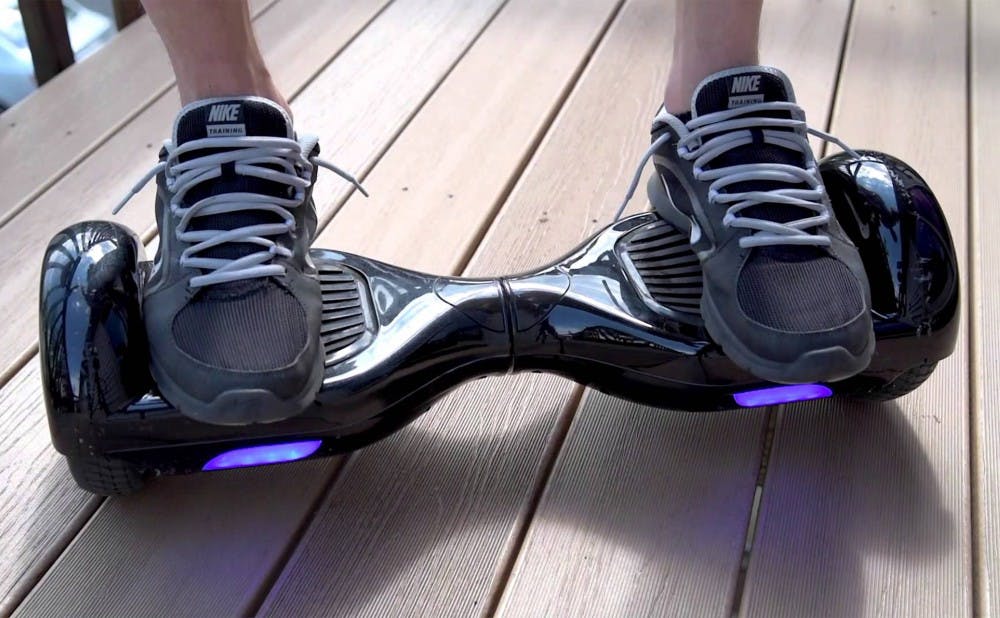Housing, Dining and Residence Life recently announced a ban on hoverboards from residence halls and apartments.
Hoverboards—the popular name for self-balancing scooters—have been banned by approximately 20 college campuses nationwide due to safety concerns. Other institutions such as airlines have also issued bans. Hoverboards have been reported to spontaneously ignite while in use or charging, resulting in 28 hoverboard-related fires in 19 states, according to records by the U.S. Consumer Product Safety Commission.
“This new policy is being implemented because of recent safety concerns raised by the Consumer Product Safety Commission and the potential impact of the associated risks of fire and falls/collisions,” Dean for Residential Life Joe Gonzalez wrote in an email to the student body.
The residential policies and community expectations list online has been updated to reflect the ban.
“ALL self-balancing scooters, also referred to as battery-operated scooters or hands-free segways and more popularly known as hoverboards or hover boards, will be banned from use and/or storage within the residence halls and apartments,” the site states.
One of the main safety issues concerning hoverboards is the rechargeable lithium batteries they contain.
Michael Gustafson, associate professor of the practice of electrical and computer engineering, explained in an email that lithium ion batteries are effective in storing relatively large amounts of energy in relatively small spaces. If the battery is built poorly or is damaged in some way, that relatively large amount of energy may get rapidly and uncontrollably expended—“usually leading to a fire or worse.”
The ban of hoverboards on airlines is reasonable due to the possibility and past occurrences of fires caused by such devices, Gustafson noted. Turbulence and other movements in air travel could lead to impacts that cause structural degradation in the batteries and “airlines would be irresponsible not to ban such potential hazards,” he wrote.
Gustafson noted that universities are wise to follow the trend of banning hoverboards.
“With the safety of students as a top priority, and with the potential for fires in dorms that may harm or even kill students, a policy banning such devices makes good sense,” he wrote.
The ban on campus applies to a small population of Duke students who use hoverboards.
“I personally do not own [a hoverboard] but I have friends that do, and I have ridden one in the halls before,” freshman Eyram Klu said. “If the user is not skilled it could be a bit dangerous, but otherwise no real threat is posed.”
Klu added that the reports of hoverboards exploding is most likely what concerns Duke administrators.
“I do not blame [HDRL], although it seems that there haven’t been any incidents on campus of a fire starting because of one yet,” he noted.
In a public statement Dec. 16, Elliot Kaye, chairman of the U.S. CPSC, stated that further investigation of the causes of hoverboard-related fires was necessary. CPSC investigators have purchased hoverboards on the market and acquired those that caused fires for examination.
“CPSC engineers in our National Product Testing and Evaluation Center in Maryland have tested and will continue to test new and damaged boards in search of an answer for why some models caught fire during the charging stage and others caught fire while in use,” Kaye wrote in the statement.
Kaye also noted that the risks of hoverboards were not solely attributed to fires and stated that a significant amount of injuries were due to falls and collisions.
Klu, however, said he believes that the popularity of the hoverboard will lessen with time.
“Overall [a hoverboard] is a nice thing to have but not necessary at all, and will most likely be a fad that will soon fade like Heelys and Ripsticks,” he said.

